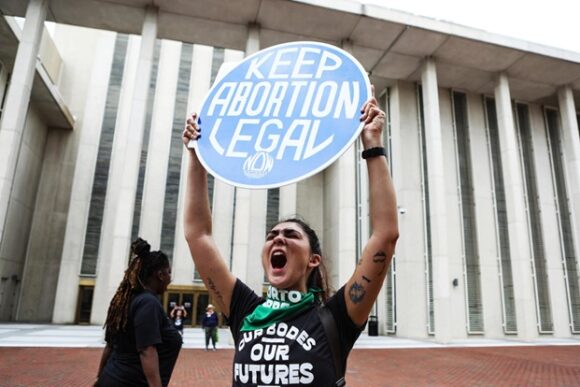 The Seattle Times.
The Seattle Times.
Dear Commons Community,
Maureen Down in her column yesterday entitled, Donald Trump, “Blasphemous Bible Thumper” refers to him as wallowing in his Messiah complex. She calls him “a false God” similar to the Golden Calf of the Israelites. In reality, “he is a miserable human who cheated on his wives, cheats at golf, cheats at politics, incites violence, targets judges and their families and looked on, pleased, as thugs threatened to hang his actually pious vice president.”
She concludes that “Religious snake-oil salesmen have a storied history in American literature and films, from Flannery O’Connor’s “Wise Blood” to Peter Bogdanovich’s beloved movie “Paper Moon,” about a conniving Bible salesman. But it’s shocking when the charlatan might be in the Oval Office.”
Below is her entire column. It is so right on!
Tony
——————————————————————————-
The New York Times
Donald Trump, Blasphemous Bible Thumper
March 30, 2024
By Maureen Dowd
Opinion Columnist, reporting from Washington.
On this holy weekend, one man is taking the Resurrection personally.
Donald Trump is presenting himself as the Man on the Cross, tortured for our sins. “I consider it a great badge of courage,” he tells crowds. “I am being indicted for you.” Instead of Christ-like redemption, he promises Lucifer-like retribution if resurrected.
In January, he put up a video on Truth Social about how he is a messenger from God, “a shepherd to mankind.”
Trump is, as the nuns who taught me used to say, “a bold, brazen piece.” He is a miserable human who cheated on his wives, cheats at golf, cheats at politics, incites violence, targets judges and their families and looked on, pleased, as thugs threatened to hang his actually pious vice president.
Yet, more and more, Trump is wallowing in his Messiah complex.
Two-Corinthians Trump wouldn’t know the difference between Old and New Testaments. So he may not realize that, rather than a sacrificial lamb, he is the Golden Calf, the false god worshiped by Israelites when Moses went up to Mount Sinai to get the Ten Commandments.
Just as the Israelites melted their ornaments and jewelry to make the calf, Trump is trading tacky products for gilt to pay gazillions in obligations. After his $399 golden “Never Surrender High-Top Sneaker,” Trump is selling a $99 “Victory” cologne for “movers, shakers and history makers” with “a crisp opening of citrus blends into a cedar heart, underpinned by a rich base of leather and amber, crafting a commanding presence.” A gold bust of Trump tops the bottle. (“Victory” perfume for women comes in a Miss Universe-shape bottle.)
Weaponizing his martyrdom, Trump is selling $59.99 “God Bless the USA” Bibles adorned with a flag and the chorus of Lee Greenwood’s song handwritten by the singer, plus the Constitution, Declaration of Independence and Pledge of Allegiance.
“Happy Holy Week!” he wrote on Truth Social. “Let’s Make America Pray Again. As we lead into Good Friday and Easter, I encourage you to get a copy of the God Bless The USA Bible.”
David Axelrod says that, even as a secular Jew, he’s offended: “This is a guy who has violated 11 of the Ten Commandments.”
Trump posted a promotional video claiming “Christians are under siege” and vowing to “protect content that is pro-God.” He held up the Bible — recalling the appalling moment in 2020 when Ivanka handed him a Bible from her designer bag and he clutched it in front of St. John’s Church, opposite the White House, moments after the police tear-gassed protesters and journalists in adjacent Lafayette Square at a demonstration about George Floyd’s murder.
“All Americans need a Bible in their home, and I have many,” Trump barked. “It’s my favorite book.” Maybe the Bible has replaced that Hitler book Trump’s ex-wife said he kept by his bed. But it’s all a scam. Running for president is about enriching himself, just as when he peddled NFTs, steaks, ties, suits, bath towels, vodka, water, office chairs, Trump University and mug-shot mugs. He even sold pieces of the suit he was wearing when he took the mug shot.
“I want to have a lot of people have it,” Trump said of his Bible. “You have to have it for your heart, for your soul.”
Just what the world needs: a soul cleanse with a grifter Bible, where the profits could well be going to pay legal costs in trials about breaking commandments — bearing false witness to try to steal democracy, coveting a porn star, then paying the star hush money to keep quiet about the sex.
What could be more Elmer Gantry than that? As Sinclair Lewis wrote about his corrupt, power-hungry, narcissistic, womanizing preacher, “He had, in fact, got everything from the church and Sunday school, except, perhaps, any longing whatever for decency and kindness and reason.”
Religious snake-oil salesmen have a storied history in American literature and films, from Flannery O’Connor’s “Wise Blood” to Peter Bogdanovich’s beloved movie “Paper Moon,” about a conniving Bible salesman and his small helper. But it’s shocking when the charlatan might be in the Oval.
In her 2016 book, “The Confidence Game,” Maria Konnikova explained that we’re easy prey for faux Nigerian princes because of all the chaos in our world. “The whirlwind advance of technology heralds a new golden age of the grift,” she wrote. “Cons thrive in times of transition and fast change.”
If there is one thing Trump knows how to do, it’s exploit chaos he creates.
There has to be a yearning in the populace that the con man can channel; and, at a time when religion and patriotism are waning, people are searching for more. Unfortunately, these days that search often takes the form of conspiracy theories.
As Donie O’Sullivan reported for CNN, no sooner had the Francis Scott Key Bridge collapsed in Baltimore than a bunch of crazy conspiracy tales blossomed about terrorism, D.E.I., Obama, Israel and Ukraine.
Declining faith in religion and rising faith in conspiracies create fertile ground for a faker like Trump. If the profane pol is re-elected, we’ll all reap the whirlwind.












